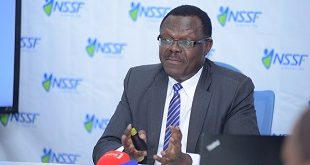
The police last month also revealed that they had recovered an assault rifle that their ballistic experts identified as the same gun used in killing of then Assistant Inspector General of Police, Andrew Felix Kaweesi and Maj. Muhammed Kiggundu; a former ADF fighter who switched side to work with the government.
At least five suspects arrested in connection with the attack, in which the minister’s daughter and his driver were shot dead, allegedly told interrogators that they were part of ADF cells active in Kampala.
The attackers were allegedly commanded by one Sheikh Abudin Hubaida Taheel Bukenya, an ADF fighter pardoned by the government under the Amnesty Law.
The Police said their investigations showed that the suspects travelled from DR Congo, Mozambique, Kenya, and Tanzania. They said the Ugandan terrorists have links to terror groups fighting in northern Mozambique. All are allegedly affiliates of ISIL.
The report showed how, in the DR Congo, ISIL has extended its area of operation in early 2021 outside Beni, in North Kivu Province, and the southern part of Ituri Province. It says ISIL has been active in South Kivu and Tanganyika Provinces, attacking military and civilian targets. It said ISIL is using women and children as human shields to prevent counter-attacks.
It points at in-fighting within the ADF between Musa Baluku, who leads the group, and rivals opposed to ADF’s links to ISIL.
The report said ISIL recruits new fighters with promises of employment and a sense of belonging. Its leadership consists primarily of Tanzanian nationals, as well as individuals from Burundi, the Democratic Republic of the Congo and Kenya.
Far-reaching impact
According to counter-terrorism experts, the growing influence of ISIL (Da’esh) in Africa may have far-reaching implications for the peace, security and stability of the region.
Vladimir Voronkov’s report said there is interplay between terrorism and state fragility due to internal conflicts and urges the UN to double support to countries in Africa that face such threats.
“A global response is urgently needed to support the efforts of African countries and regional organisations to counter terrorism and address its interplay with conflict, organized crime, governance and development gaps,” said Voronkov.
It warns that if nothing is done urgently, the terrorists could regain the the ability to orchestrate international attacks if either its core or one of its regional affiliates is allowed to become strong enough.
Voronkov’s call was backed by the Indian External Affairs Minister Subrahmanyam Jaishankar.
“ISIL (Daesh) remains active in Syria and Iraq and its affiliates are growing in strength, particularly in Africa. The financial resource mobilisation of ISIL (Daesh) has become more robust. The flow of funds has continued and rewards for killings are now even being paid in Bitcoins!” he said.
He added: “Let us always remember that what is true of Covid is even more true of terrorism: none of us are safe until all of us are safe”.
India held the rotational presidency of the UN Security Council for the month of August. During its term, India organised three high-level signature meetings focusing on counter-terrorism, maritime security, and peacekeeping.
In response to Voronkov’s report, the UK’s Ambassador at the Security Council, James Kariuki, said as the terror threat continues to grow in sub-Saharan Africa, his government is providing security, stabilisation and humanitarian assistance in many affected countries to help them tackle the threat, build stability, and support affected communities.
But he cautioned: “When countering terrorism, we must all ensure that we protect and promote human rights, fundamental freedoms and the rule of law. We must integrate a gender sensitive and whole of society approach into our efforts.”
The report echoed the four strategic counter-terrorism challenges facing the world today which Vladimir Voronkov has underscored previously.
Voronkov lists the strategic challenges as the threat of the ISIL legacy in Iraq and Syria, terrorist threats in Africa, transnational risks sparked by various forms of intolerance, and the need to upgrade technology and know-how to counter the scourge.
Voronkov believes that while preparing for tomorrow’s terrorist threats, counter-terrorists agencies also need to change from traditional tactics.
 The Independent Uganda: You get the Truth we Pay the Price
The Independent Uganda: You get the Truth we Pay the Price



